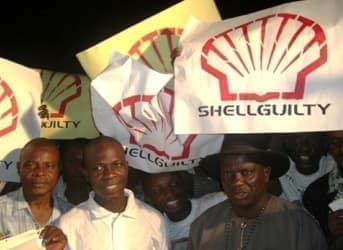In Kiobel vs. Royal Dutch Petroleum, the US Supreme Court has ruled that Nigerian nationals do not have the right to sue the oil company for alleged rights abuses overseas, dashing the hopes of Esther Kiobel, who filed her lawsuit against Shell in 2002 shortly before she became a US citizen.
Supreme Court Chief Justice John Roberts cited the Alien Tort Statue of 1789, which does not extend to violations outside the US.
Essentially, then, this major victory for oil and gas giants operating as multinational companies is thanks to a law that is over two centuries old.
Kiobel, along with 11 other Nigerians, was suing Shell for collusion with the government regarding a brutal crackdown on residents of the Niger Delta that included torture and execution. In 1995, in a kangaroo case with trumped-up charges, the “Ogoni Nine” were executed in Nigeria. Kiobel’s husband was among those executed.
Ogoniland is a small area of the Niger Delta that was the stage for peaceful protests in the 1990s. The “Ogoni Nine” were members of the Movement for the Survival of Ogoni Peoples (MOSOP). While oil drilling ceased in 1993, spills have continued from aging pipelines, oil “bunkering” (theft), and hastily abandoned and unsecure oil infrastructure.
Related article: GE Oil & Gas: Ambitious Diversity that Pays Off
Along with the Nigerian state-run NNPC oil company, Shell is operating pipelines across Ogoni that are in some places more than 40 years old and there are other examples of operational failures that see facilities used well beyond their intended lifespan.
Overall, the land and rivers of the Niger Delta are indelibly polluted thanks to decades of unchecked oil extraction. Farming and fishing livelihoods have been decimated. Standards of living are appalling, health conditions horrifying and human rights abuses vast.
In August 2011, the UNEP requested an initial $1 billion to clean up the area – a task that will take an estimated 25-30 years.
In response to the UNEP report, Shell insisted that the “majority of the oil spills in Nigeria are caused by sabotage, theft and illegal refining. We urge the Nigerian authorities to do all they can to curb such activity, and we will continue working with our partners in Nigeria, including the government, to solve these problems and on the next steps to help clean up Ogoniland."
Related article: Finding Good Investments in Areas with Growing Oil Production
According to ISA Intel, which has conducted tactical investigations in the Niger Delta, oil companies have largely bought out the Nigerian government to turn the other way to environmental and human rights abuses. “Graft and corruption are unbridled. Those who will not be bought are considered enemies of the state, and this is what largely appears to have happened to the ‘Ogoni Nine’,” experts with the private intelligence company told Oilprice.com.
Other multinationals with litigation pending will be eyeing this optimistically, not the least Exxon Mobil Corp for its actions in Indonesia. Exxon is being sued by 15 Indonesian villagers for the death and torture of people in Aceh province between 1999 and 2001. The plaintiffs claim that Exxon hired Indonesian soldiers who had committed past abuses to guard their natural gas facility.
In July 2011, a US federal appeals court ruled that the case could go forward and has placed Exxon’s request to review this decision on hold while the Nigeria-Kiobel case was still being heard. For now, it remains unclear what the implications of the Shell ruling will be for the Exxon-Indonesia case.
By. Charles Kennedy of Oilprice.com


















